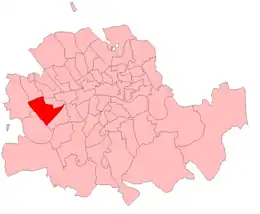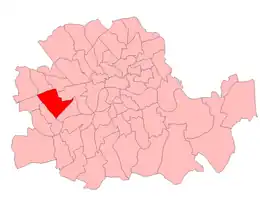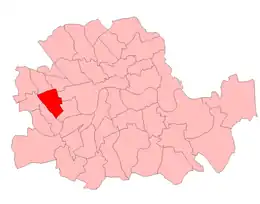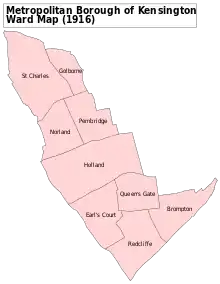| Kensington South | |
|---|---|
| Former Borough constituency for the House of Commons | |
| 1885–February 1974 | |
| Seats | one |
| Created from | Chelsea |
| Replaced by | Kensington |
Kensington South was a parliamentary constituency centred on the Kensington district of west London. It returned one Member of Parliament (MP) to the House of Commons of the Parliament of the United Kingdom.




The constituency was created for the 1885 general election, and abolished for the February 1974 general election. In every postwar election until its abolition, it was the safest Conservative seat (excluding Northern Irish constituencies) in the country.
Members of Parliament
| Election | Member | Party | |
|---|---|---|---|
| 1885 | Sir Algernon Borthwick | Conservative | |
| 1895 by-election | Lord Warkworth (known as Earl Percy from 1899) | Conservative | |
| 1910 | Lord Claud Hamilton | Conservative | |
| 1918 | Sir William Davison | Conservative | |
| 1945 by-election | Richard Law | Conservative | |
| 1950 | Sir Patrick Spens | Conservative | |
| 1959 | William Roots | Conservative | |
| 1968 by-election | Sir Brandon Rhys-Williams | Conservative | |
| Feb 1974 | constituency abolished | ||
Boundaries
Prior to 1885, the area was originally part of the Chelsea constituency. Following the Redistribution of Seats Act 1885, the new Kensington South seat was a single-member constituency consisting of all of the parliamentary borough of Kensington south of the Uxbridge Road.
Following boundary changes under the Representation of the People Act 1918, the constituency was defined as consisting of the Royal Borough of Kensington wards of Brompton, Earl's Court, Holland, Queen's Gate, and Redcliffe.
In the 1950 redistribution, Brompton ward was transferred to the Chelsea constituency. The constituency was thus now defined as consisting of the Royal Borough of Kensington wards of Earl's Court, Holland, Queen's Gate, and Redcliffe. It then remained unchanged until its abolition in 1974.
In 1965, under major local government boundary changes, the London County Council area was absorbed by the new Greater London Council, and the constituency was included in a new London Borough of Kensington and Chelsea. This did not affect parliamentary boundaries for another nine years, however.
In the 1974 redistribution, this constituency disappeared. Earl's Court and Redcliffe wards became part of the redrawn Chelsea constituency, while Holland and Queen's Gate wards became part of the new Kensington constituency.
Election results
Elections in the 1880s
| Party | Candidate | Votes | % | ±% | |
|---|---|---|---|---|---|
| Conservative | Algernon Borthwick | 4,602 | 68.3 | ||
| Liberal | Montagu Hughes Cookson | 2,138 | 31.7 | ||
| Majority | 2,464 | 36.6 | |||
| Turnout | 6,740 | 76.1 | |||
| Registered electors | 8,859 | ||||
| Conservative win (new seat) | |||||
| Party | Candidate | Votes | % | ±% | |
|---|---|---|---|---|---|
| Conservative | Algernon Borthwick | 4,156 | 80.3 | +12.0 | |
| Liberal | Henry Fearnside Speed | 1,022 | 19.7 | -12.0 | |
| Majority | 3,134 | 60.6 | +24.0 | ||
| Turnout | 5,178 | 58.4 | −17.7 | ||
| Registered electors | 8,859 | ||||
| Conservative hold | Swing | +12.0 | |||
Elections in the 1890s
| Party | Candidate | Votes | % | ±% | |
|---|---|---|---|---|---|
| Conservative | Algernon Borthwick | Unopposed | |||
| Conservative hold | |||||
| Party | Candidate | Votes | % | ±% | |
|---|---|---|---|---|---|
| Conservative | Algernon Borthwick | Unopposed | |||
| Conservative hold | |||||
| Party | Candidate | Votes | % | ±% | |
|---|---|---|---|---|---|
| Conservative | Henry Percy | Unopposed | |||
| Conservative hold | |||||
Elections in the 1900s
| Party | Candidate | Votes | % | ±% | |
|---|---|---|---|---|---|
| Conservative | Henry Percy | Unopposed | |||
| Conservative hold | |||||
| Party | Candidate | Votes | % | ±% | |
|---|---|---|---|---|---|
| Conservative | Henry Percy | 4,835 | 74.9 | N/A | |
| Liberal | Edward O'Malley | 1,624 | 25.1 | New | |
| Majority | 3,211 | 49.8 | N/A | ||
| Turnout | 6,459 | 70.0 | N/A | ||
| Registered electors | 9,223 | ||||
| Conservative hold | Swing | N/A | |||
Elections in the 1910s
| Party | Candidate | Votes | % | ±% | |
|---|---|---|---|---|---|
| Conservative | Claud Hamilton | 5,771 | 81.6 | +6.7 | |
| Liberal | George Stanford MacIlwaine | 1,301 | 18.4 | -6.7 | |
| Majority | 4,470 | 63.2 | +13.4 | ||
| Turnout | 9,159 | 77.2 | +7.2 | ||
| Conservative hold | Swing | ||||
| Party | Candidate | Votes | % | ±% | |
|---|---|---|---|---|---|
| Conservative | Claud Hamilton | 5,093 | 83.1 | +1.5 | |
| Liberal | George Rodhouse Reid | 1,033 | 16.9 | -1.5 | |
| Majority | 4,060 | 66.2 | +3.0 | ||
| Turnout | 9,159 | 66.9 | -10.3 | ||
| Conservative hold | Swing | ||||
| Party | Candidate | Votes | % | ±% | |
|---|---|---|---|---|---|
| C | Unionist | William Davison | 10,693 | 66.8 | −16.3 |
| National | Ernest Makins | 5,306 | 33.2 | New | |
| Majority | 5,387 | 33.6 | −32.6 | ||
| Turnout | 15,999 | 51.8 | −15.1 | ||
| Registered electors | 30,888 | ||||
| Unionist hold | Swing | −16.3 | |||
| C indicates candidate endorsed by the coalition government. | |||||
Elections in the 1920s
| Party | Candidate | Votes | % | ±% | |
|---|---|---|---|---|---|
| Unionist | William Davison | 15,760 | 76.0 | +9.2 | |
| Independent | * Ferdinand Cavendish-Bentinck | 4,964 | 24.0 | New | |
| Majority | 10,796 | 52.0 | +18.4 | ||
| Turnout | 20,724 | 58.1 | +6.3 | ||
| Registered electors | 35,684 | ||||
| Unionist hold | Swing | +9.2 | |||
*Cavendish-Bentinck was incorrectly labelled by the media as a National Liberal but corrected this label as 'anti-Conservative'.
| Party | Candidate | Votes | % | ±% | |
|---|---|---|---|---|---|
| Unionist | William Davison | Unopposed | |||
| Unionist hold | |||||
| Party | Candidate | Votes | % | ±% | |
|---|---|---|---|---|---|
| Unionist | William Davison | Unopposed | |||
| Unionist hold | |||||
| Party | Candidate | Votes | % | ±% | |
|---|---|---|---|---|---|
| Unionist | William Davison | 28,049 | 66.9 | N/A | |
| Liberal | Hugh Seely | 7,570 | 18.0 | New | |
| Ind. Unionist | Rayner Goddard | 6,354 | 15.1 | New | |
| Majority | 20,479 | 48.9 | N/A | ||
| Turnout | 41,973 | 59.5 | N/A | ||
| Registered electors | 70,593 | ||||
| Unionist hold | Swing | N/A | |||
Elections in the 1930s
| Party | Candidate | Votes | % | ±% | |
|---|---|---|---|---|---|
| Conservative | William Davison | Unopposed | N/A | N/A | |
| Conservative hold | Swing | N/A | |||
| Party | Candidate | Votes | % | ±% | |
|---|---|---|---|---|---|
| Conservative | William Davison | 38,297 | 88.9 | N/A | |
| Labour | Charles Henry Hartwell | 4,779 | 11.1 | New | |
| Majority | 33,518 | 77.8 | N/A | ||
| Turnout | 69,520 | 62.0 | N/A | ||
| Conservative hold | Swing | N/A | |||
Elections in the 1940s
| Party | Candidate | Votes | % | ±% | |
|---|---|---|---|---|---|
| Conservative | William Davison | 22,166 | 69.8 | -19.1 | |
| Labour | Patricia Strauss | 6,014 | 18.9 | +8.8 | |
| Liberal | Francis N Beaufort-Palmer | 3,586 | 11.3 | New | |
| Majority | 16,152 | 50.9 | -26.9 | ||
| Turnout | 46,727 | 67.9 | +5.9 | ||
| Conservative hold | Swing | ||||
| Party | Candidate | Votes | % | ±% | |
|---|---|---|---|---|---|
| Conservative | Richard Law | 15,846 | 81.7 | +11.9 | |
| Liberal | Lancelot Spicer | 3,559 | 18.3 | +7.0 | |
| Majority | 12,287 | 68.4 | +17.5 | ||
| Turnout | 52,750 | 36.8 | -29.1 | ||
| Conservative hold | Swing | ||||
Elections in the 1950s
| Party | Candidate | Votes | % | ±% | |
|---|---|---|---|---|---|
| Conservative | Patrick Spens | 32,870 | 73.1 | +3.3 | |
| Labour | Marcel Philip Picard | 8,002 | 17.8 | -1.1 | |
| Liberal | John Frankenburg | 4,079 | 9.1 | -2.2 | |
| Majority | 24,868 | 55.3 | +4.4 | ||
| Turnout | 63,319 | 71.0 | +3.1 | ||
| Conservative hold | Swing | ||||
| Party | Candidate | Votes | % | ±% | |
|---|---|---|---|---|---|
| Conservative | Patrick Spens | 34,592 | 79.5 | +6.4 | |
| Labour | Michael Clynes Parker | 8,894 | 20.5 | +2.7 | |
| Majority | 25,698 | 59.0 | +5.7 | ||
| Turnout | 63,419 | 68.6 | -2.4 | ||
| Conservative hold | Swing | ||||
| Party | Candidate | Votes | % | ±% | |
|---|---|---|---|---|---|
| Conservative | Patrick Spens | 32,051 | 82.5 | +3.0 | |
| Labour | Marjorie Macrae Crane | 6,804 | 17.5 | -3.0 | |
| Majority | 25,247 | 65.0 | +6.0 | ||
| Turnout | 62,724 | 62.0 | -6.6 | ||
| Conservative hold | Swing | ||||
| Party | Candidate | Votes | % | ±% | |
|---|---|---|---|---|---|
| Conservative | William Roots | 26,606 | 74.3 | -8.2 | |
| Liberal | Gurth Hoyer-Millar | 4,666 | 13.0 | New | |
| Labour | Ivor Richard | 4,525 | 12.6 | -4.9 | |
| Majority | 21,940 | 61.3 | -3.7 | ||
| Turnout | 58,023 | 61.7 | -0.3 | ||
| Conservative hold | Swing | ||||
Elections in the 1960s
| Party | Candidate | Votes | % | ±% | |
|---|---|---|---|---|---|
| Conservative | William Roots | 21,668 | 68.0 | -3.3 | |
| Labour | Barrington J Stead | 5,300 | 16.6 | +4.0 | |
| Liberal | Anthony A W Dix | 4,916 | 15.4 | +2.4 | |
| Majority | 16,368 | 51.3 | -10.0 | ||
| Turnout | 56,157 | 56.8 | -3.9 | ||
| Conservative hold | Swing | ||||
| Party | Candidate | Votes | % | ±% | |
|---|---|---|---|---|---|
| Conservative | William Roots | 21,050 | 65.1 | -2.9 | |
| Labour | Jonathan V Rosenhead | 6,419 | 19.8 | +3.2 | |
| Liberal | Thomas Kellock | 4,871 | 15.1 | -0.3 | |
| Majority | 14,631 | 45.3 | -6.0 | ||
| Turnout | 55,660 | 58.1 | +1.3 | ||
| Conservative hold | Swing | ||||
| Party | Candidate | Votes | % | ±% | |
|---|---|---|---|---|---|
| Conservative | Brandon Rhys-Williams | 16,489 | 75.5 | +10.4 | |
| Liberal | Thomas Kellock | 2,742 | 12.6 | -2.5 | |
| Labour | Clive Bradley (executive) | 1,874 | 8.6 | -11.2 | |
| Independent | Sinclair Eustace | 675 | 3.1 | New | |
| Independent | William Gold | 59 | 0.3 | New | |
| Majority | 13,747 | 62.9 | +17.6 | ||
| Turnout | 21,839 | 40.0 | -18.1 | ||
| Conservative hold | Swing | ||||
Elections in the 1970s
| Party | Candidate | Votes | % | ±% | |
|---|---|---|---|---|---|
| Conservative | Brandon Rhys-Williams | 21,591 | 75.7 | +10.6 | |
| Labour | Faith M Bridges | 6,928 | 24.3 | +4.5 | |
| Majority | 14,663 | 51.4 | +6.1 | ||
| Turnout | 57,182 | 49.9 | -8.2 | ||
| Conservative hold | Swing | ||||
References
- Leigh Rayment's Historical List of MPs – Constituencies beginning with "K" (part 1)
- British Parliamentary Election Results 1885-1918, compiled and edited by F.W.S. Craig (Macmillan Press 1974)
- Debrett’s Illustrated Heraldic and Biographical House of Commons and the Judicial Bench 1886
- Debrett’s House of Commons and the Judicial Bench 1901
- Debrett’s House of Commons and the Judicial Bench 1918